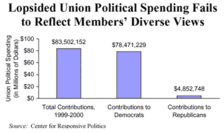
What do you think would happen to a publicly traded, billion-dollar corporation if it refused to supply investors with a prospectus or annual report of its financial dealings?
Such a company would not be long for this world. It would run afoul of the U.S. Securities and Exchange Commission (SEC), to say nothing of failing to attract investors, and go belly up in short order.
Why, then, are America's labor unions, many of which collect compulsory dues from millions of workers each year and wield multi-billion dollar budgets, allowed to operate without giving their members a clear accounting of their financial dealings or how those dues are spent?
Unions collect an estimated $13 billion in dues each year to fund their various efforts, including political and other activities. But how much of that $13 billion is spent on collective bargaining and other core employee representation duties and how much goes to lobbying and other peripheral activities? Since unions are not required to make any meaningful disclosures of their political expenditures, it's impossible to say.
However, in two cases where the U.S. Supreme Court examined union finances, Lehnert v. Ferris Faculty Association and Communications Workers v. Beck , it found that 90 percent and 79 percent, respectively, of union dues paid had nothing to with employee representation and everything to do with advancing the unions' political and social agenda. Unions certainly have the right to participate in the political process, but with that right comes a responsibility: The Court ruled in both cases that unions must respect the rights of workers to know how much of their dues are being spent on politicking—and to opt out of paying for that politicking.
But despite the Supreme Court decisions, workers have had a tough time finding out just how much of their dues dollars go to fund activities unrelated to collective bargaining, and many have even suffered union retaliation just for attempting to assert their rights. The government is of little help to these workers: The U.S. Department of Labor does not require unions to disclose or report any of their political spending or activity beyond a yes-or-no answer as to whether or not a given union has a political action committee fund.
In other words, the political spending of most unions—including public-sector unions like the powerful Michigan Education Association—goes largely unreported. At a time when the issue of campaign finance reform is occupying a large amount of politicians and pundits' time, the "elephant in the living room" fact of union politicking fails to attract much public attention.
It's long past time to treat unions as we treat corporations and require them to make meaningful disclosures of their political and other expenditures to the general public—and to their dues-paying "investors." Michigan and federal lawmakers should pass legislation to require annual disclosure of union financial dealings, reported through an independent, third-party auditor, using uniform accounting standards. Union disclosure, similar to SEC regulations governing corporate disclosure, should include breakdowns of a) assets and liabilities; b) salaries paid to officials and support staff; c) contributions to state or national affiliates; d) funding for organizing activities, contract negotiations, and other collective bargaining related activities; and e) funding for any political or lobbying activities, with detailed listing of candidates, organizations, political parties, or other entities receiving union dues money.
Being a member of a union is not like being a member of, for example, the Rotary Club, where individuals voluntarily join because of the values promoted by the organization. Unionization in the 21 states, including Michigan, that lack a right-to-work law often involves at least a mandatory dues payment as a condition of employment. If union leaders believe the political, social, and lobbying activities they are engaged in ultimately serve the interests of union workers and the labor movement as a whole, they should make that case before their members. If workers still disagree, unions should be willing to comply with the law as it stands and refund to members that portion of dues used to subsidize the union's non-workplace-related agenda.
Investors voluntarily choose which firms to invest in based in part upon financial information the law requires corporations to provide to the general public. Shouldn't union workers—who are forced to pay dues—be allowed the same courtesy?

The Mackinac Center for Public Policy is a nonprofit research and educational institute that advances the principles of free markets and limited government. Through our research and education programs, we challenge government overreach and advocate for a free-market approach to public policy that frees people to realize their potential and dreams.
Please consider contributing to our work to advance a freer and more prosperous state.